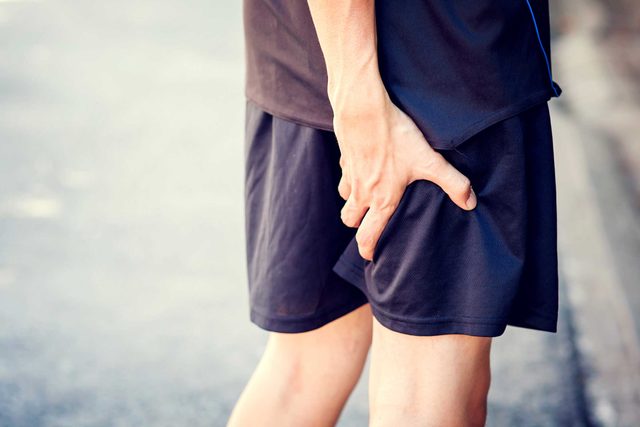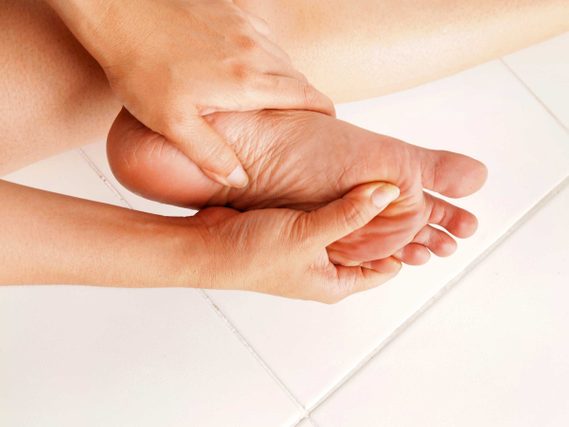
A quick-onset headache
If the pain in your head occurred suddenly and is unbearably bad, you could have a brain aneurysm, a bulge in the wall of an artery. Left untreated, the blood vessel could burst, leading to a potentially fatal stroke or massive brain bleed. Call the ambulance immediately. But in most cases, it’s likely just a headache. Here are the main types of headaches—and how to get rid of them.

Tooth pain when you drink something cold
If the enamel (the outside layer of your tooth) is damaged or decaying, it can expose the nerve inside your tooth, leaving you with intolerable pain when the area comes into contact with any cold or hot substances. In addition to the sensitivity, an exposed nerve also puts you at risk for a bacterial infection that can spread to other parts of your body. See your dentist if you start experiencing extreme tooth sensitivity. Never ignore these signs that your cut or scrape is infected.

Pain through the hand, wrist, and forearm
If a pain or numbing sensation affects your fingers (particularly the thumb, index finger, and middle finger), palm and wrist and spreads to the forearm, you could have carpal tunnel syndrome. Left untreated, the hand muscles may shrink and you may even lose function of your hand. Consult your doctor as soon as possible for treatment options. Ask your doctor these questions before taking antibiotics.

Pain that spreads across your chest
Chest pain is a classic sign of a heart attack, caused by the lack of oxygen reaching your heart. The pain may also move toward your jaw, shoulder, or neck. Call an ambulance immediately. Watch for these other silent signs of a heart attack.

Dull pain in the mid-back
If the pain gets progressively worse and is accompanies by fever and nausea, you could have a kidney infection. See your doctor as soon as possible. The infection could cause permanent damage to the kidneys, blood poisoning, or a complete kidney shutdown. In the meantime, try one of these proven remedies for fast pain relief.

Pain that starts in the lower back and affects the legs
This type of pain is commonly a sign of sciatica, brought on by injury or pressure on the sciatic nerve. Talk to your doctor about pain management and treatment options. If there is also weakness in your legs, loss of bladder sensation, or new urinary incontinence, you could have cauda equina syndrome, a rare disorder that can cause permanent paralysis. Here are 8 more reasons for your back pain.

Pain in the lower right of the gut
If you are also experiencing a fever, nausea and/or vomiting, you could have appendicitis. A burst appendix can lead to a potentially life-threatening infection. Visit your doctor, who may send you to the hospital for surgery. Is your body pain combined with weight gain? It could be a sign of this.

Pain in the pelvis or abdomen
Menstrual cramps are normal for many women. If they become continually worse or don’t go away, you could have endometriosis, a condition where tissue that is supposed to grow inside the uterus starts growing outside the uterus. See your Ob-Gyn to get a diagnosis. Not doing so increases your risk of infertility. Watch for these signs your upper abdominal pain is an emergency.

Achy or cramping pain in the leg
If the pain is accompanied by redness, warmth, and swelling, you could have a blood clot known as a deep-vein thrombosis (DVT). Visit your doctor, who will arrange for you to have an ultrasound. Do NOT massage the painful area, as this might cause the blood clot to travel to your heart or lungs. Look out for these types of leg pain that you shouldn’t ignore.

Constant pins and needles in your feet
If your feet are numb, burning or tingly, you could have nerve damage caused by diabetes. You may even lose all feeling in your foot. Visit your doctor, who will send you for a blood glucose test. The affected limb may need to be amputated if the damage is severe enough. Next, discover the hidden signs you’re not as healthy as you think.
